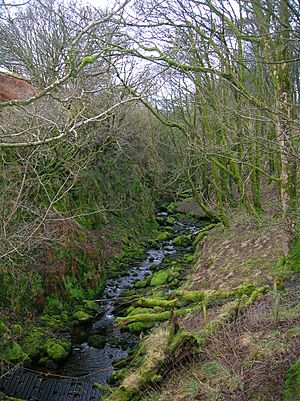Glen facts for kids
A glen is a type of valley that usually has gentle, not steep, slopes. Glens are often long and narrow. You'll mostly find them in the Northern Hemisphere, which is the top half of our planet. They are often formed by rivers or glaciers carving out the land over many, many years.
Contents
What is a Glen?
A glen is a special kind of valley. Imagine a long, narrow dip in the land, often with a river or stream flowing through its bottom. Unlike some valleys that have very steep sides, glens usually have more gradual slopes, making them easier to walk through. The word "glen" comes from the Scottish Gaelic word gleann, which means "valley" or "hollow."
How Glens are Formed
Most glens are shaped by two main forces:
- Rivers: Over thousands of years, rivers slowly wear away the rock and soil, carving out a path. This process is called erosion. The constant flow of water deepens and widens the valley, creating the long, gentle slopes typical of a glen.
- Glaciers: During ice ages, huge sheets of ice called glaciers moved across the land. As they slid, they scraped away rock and soil, creating U-shaped valleys. When the glaciers melted, these valleys often became glens, sometimes with lakes or rivers filling their bottoms.
Where Glens are Found
Glens are common in certain parts of the world, especially in areas that were once covered by glaciers or have many rivers. You'll find many famous glens in:
- Scotland: This is where the term "glen" is most widely used. Scotland is famous for its beautiful glens, like Glen Coe and Glen Nevis.
- Ireland: Similar to Scotland, Ireland has many scenic glens, such as the Glens of Antrim.
- Isle of Man: This island in the Irish Sea also features several small, picturesque glens.
- Other regions: While less common, similar landforms might be called glens in parts of England, Canada, and the United States, especially in areas with Celtic heritage.
Life in a Glen
Glens are often home to diverse wildlife and plant life. The sheltered environment, often with a river, provides a perfect habitat for many species.
Plants and Trees
The slopes of glens are often covered with forests, especially conifer trees like pine and spruce, or deciduous trees like oak and birch. The damp conditions near the riverbed can support lush mosses, ferns, and wildflowers.
Animals and Birds
Many animals thrive in glens. You might find deer grazing on the slopes, foxes hunting in the undergrowth, and badgers digging their homes. The rivers and streams are often home to fish like trout and salmon, as well as otters. Birds like eagles, hawks, and various songbirds also make their homes in the trees and cliffs of glens.
Human Settlements
Historically, glens were important places for human settlements. The rivers provided water, the slopes offered shelter, and the land could be used for farming or grazing animals. Many small villages and towns grew up in glens, and some still exist today, often attracting tourists who come to enjoy the natural beauty.
Images for kids
-
Raven's Craig Glen located in Dalry, North Ayrshire, Scotland
 | William M. Jackson |
 | Juan E. Gilbert |
 | Neil deGrasse Tyson |




